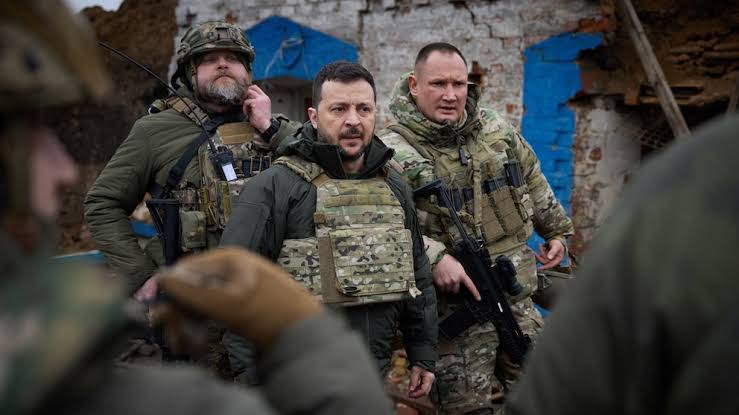
Will the U.S. Continue to Protect Democracy As Russian Forces Advance in Ukraine?
Vladimir Putin’s full-scale invasion of Ukraine in 2022 was an assault on democracy itself. Since the end of the Cold War – a period Francis Fukuyama dubbed ‘the end of history’ – western democracy appeared to have prevailed as the dominant global force after the Soviet Union’s collapse. Former Soviet states, like Poland, Hungary, Bulgaria, and Latvia, joined NATO in the years that followed. So too, the end of the Cold War marked the beginning of a new chapter in American-Russian relations: one of cooperation and a commitment to fostering democracy. Such commitments, however, were shown to be ephemeral in the face of Russian aggression against democratic free states. Initially, the west responded to the war with condemnation and a promise to protect Ukrainian independence. Yet, two years on the west’s role in supporting Ukraine has been compromised by isolationist sentiments and, in America’s case, far-right ideologies. Western aid will be crucial, now more than ever, as Russian forces are continuing to gain territory in Ukraine. In the face of creeping authoritarianism, will the west fulfil its moral obligation to protect Ukrainian independence and democracy?
As the war rages on, America’s role on the world stage appears to be shifting. After all, one of the nation’s great political parties appears increasingly reluctant to offer support to Ukraine. In April 2024, the U.S. approved a sweeping defence aid package to Ukraine, Israel, and the Indo-Pacific. In total $61 billion in aid went to war-torn Ukraine, in desperate need of relief from Russian advances. Yet, efforts to pass the defence package in Congress were hard fought, with House Speaker Mike Johnson relying largely on votes from his Democratic colleagues. In total, just 101 out of 217 Republicans voted to support aid to Ukraine; Democrats unanimously backed the defence package. In October 2023, President Joe Biden noted the critical importance of supporting fellow democracies, stating ‘If we don’t stop Putin’s appetite for power and control in Ukraine, he won’t limit himself just to Ukraine. Putin’s already threatened to “remind” Poland that their western land was a gift from Russia’. Yet, Biden’s call-to-action was followed by six months of Republican stall tactics in both the House and Senate. According to Former NATO Secretary General Anders Fogh Rasmussen, America’s inaction was costly. In an interview with Christian Amanpour, Rasmussen noted ‘The delay in American aid and the lack of fulfilment of European pledges have made it more difficult for the Ukrainians, and Putin is exploiting that situation. But provided that we deliver every single thing the Ukrainians need, I think they can reverse the development’.
Since the end of the Second World War, the United States has played a pivotal role in safeguarding democratic values throughout the world. However, in recent years the U.S. appears to have shied away from its longstanding moral responsibility of defending democracy – particularly in view of Donald Trump’s proposed ‘America First’ policy, which has usurped the GOP. Such policies, coupled with a flirtation with far-right ideology and the ‘cozying up’ to authoritarian leaders, threatens to undermine America’s role as a protector of democracy. The end of World War II put the U.S. at the forefront of global politics following decades of isolationism. In 1948, the U.S. launched the Marshall Plan to offer financial assistance to war-torn western and southern Europe, under the condition of shared cooperation. From the U.S.’s perspective, an alliance with western Europe was crucial for averting future conflicts and preventing the spread of communism across the continent. In 1949 President Harry Truman signed the North Atlantic Treaty and affirmed ‘Men with courage and vision can still determine their own destiny. They can choose slavery or vision – war or peace. … The treaty we are signing here today is evidence of the path they will follow. If there is anything certain today, if there is anything inevitable in the future, it is the will of the people of the world for freedom and for peace’.
America’s inaction was costly. In an interview with Christian Amanpour, Rasmussen noted ‘The delay in American aid and the lack of fulfilment of European pledges have made it more difficult for the Ukrainians, and Putin is exploiting that situation. But provided that we deliver every single thing the Ukrainians need, I think they can reverse the development’.
Through the North Atlantic Treaty Organization (NATO), America solidified its stance as a bulwark against communism and a protector of democracy. So too, the U.S. pledged to defend its allies against aggression. By the end of the 1980s and early-1990s, democracy seemed to have won the ideological battle. The end of the Cold War ushered in a new era of mutual interests between the U.S. and Russia – at first glance, one such interest appeared to be a Russian transition to democracy. Yet Putin’s hostile invasion of Ukraine has made clear his unwillingness to respect democracy or the sovereignty of neighbouring countries. As Putin is determined to rebuild a ‘Russian empire’ of sorts, history has shown the United States is duty-bound to respond. However, American democracy has faced its own challenges in recent years. Donald Trump’s effort to remain in office following his defeat in the 2020 presidential election, coupled with his disregard for constitutional norms, has demonstrated the fragility of America’s democratic institutions. So too, Trump’s ‘America First’ movement appears to be pulling the United States away from its role as a protector of democratic norms across the globe. In past statements, Mr Trump has gone so far as to suggest withdrawing the United States from NATO altogether and has called on Russia to attack NATO members who do not ‘pay their bills’ to western allies. A 2024 victory for Donald Trump, in the face of Russian aggression, could have catastrophic consequences for the eastern European nation fighting to preserve its way of life.
Still, American democracy, despite its challenges, remains robust – so too is Americans’ desire to aid Ukraine. In March 2024, Gallup conducted a poll which found fifty-five percent of Americans believe the U.S. should continue supporting Ukraine, even if that requires prolonged involvement. However, the stakes remain high: Putin is waging a long war of attrition. To win, he must wait for the west to lose interest in the conflict. It is paramount that western nations do not play into his hand. The United States and its allies must honour their responsibility to protect Ukraine’s right to sovereignty. After all, if Ukraine falls Putin will not stop there. Now, more than ever, western leaders must prepare to support Ukraine in the long run – the United States needs to be at the forefront of that campaign!
Dr Alex Sessa is a senior fellow of The Sixteenth Council. Our Experts’ Opinions does not necessarily represent an absolute position of the Council.
Works Cited
Remarks by President Joseph R. Biden, Jr, ‘Remarks by President Biden on the United States’ Response to Hamas’s Terrorist Attacks Against Israel and Russia’s Ongoing Brutal War Against Ukraine’, Briefing Room, Speeches and Remarks, 20 October 2023, 8:02 EDT, The White House, Washington, D.C., https://www.whitehouse.gov/briefing-room/speeches-remarks/2023/10/20/remarks-by-president-biden-on-the-unites-states-response-to-hamass-terrorist-attacks-against-israel-and-russias-ongoing-brutal-war-against-ukraine/.
Megan Brenan, ‘More Americans Say U.S. is not Helping Ukraine’, Politics, Gallup, 12 April 2024, https://news.gallup.com/poll/643601/americans-say-not-helping-ukraine-enough.aspx.
Craig Kafura and Dina Smeltz, ‘Americans Continue to Support Military and Economic Aid to Ukraine’, Public Opinion Survey, Research, The Chicago Council on Foreign Affairs, 28 February 2024, https://globalaffairs.org/research/public-opinion-survey/americans-continue-support-military-and-economic-aid-ukraine.
David G. Haglund, ‘North Atlantic Treaty Organization’, Britannica, updated 17 May 2024, https://www.britannica.com/topic/North-Atlantic-Treaty-Organization.
See Constant Méhuet, ‘Advancing Russian Troops Threaten to Reverse Some of Ukraine’s Hard-Won Gains’, Russia-Ukraine War, The New York Times, 23 May 2024, https://www.nytimes.com/2024/05/23/world/europe/ukraine-russia-battlefield-gains.html.
Remarks by Anders Fogh Rasmussen, interview with Christian Amanpour, The Amanpour Hour, CNN, Broadcast, Aired 18 May 2024 11:00AM – 12:00PM EDT, https://transcripts.cnn.com/show/camp/date/2024-05-18/segment/01.
Heather Cox Richardson, ‘Letters from an American, 4 April 2024’, Substack, Published 5 April 2024, https://heathercoxrichardson.substack.com/p/april-4-2024, accessed Monday 27 May 2024 at 15:00 BST.
See Arlette Saenz, ‘How the White House convinced Mike Johnson to back Ukraine aid’, Politics, CNN, 24 April 2024, https://edition.cnn.com/2024/04/24/politics/white-house-ukraine-funding-push/index.html.
Remarks by Harry S. Truman, Departmental Auditorium, Washington, D.C., 4 April 1949, The Signing Ceremony, North Atlantic Treaty Organization, https://www.nato.int/cps/en/natohq/declassified_137799.htm#:~:text=They%20can%20choose%20slavery%20or,for%20freedom%20and%20for%20peace.
‘Trump says he would “encourage” Russia to attack NATO allies who do not pay their bills’, War in Ukraine, US & Canada, BBC News, 11 February 2024, https://www.bbc.co.uk/news/world-us-canada-68266447.
‘Why America is vulnerable to a despot: its democratic system is not as robust as it seems’, Briefing: In the worst case, 16 May 2024, The Economist, https://www.economist.com/briefing/2024/05/16/americas-democratic-system-is-not-as-robust-as-it-seems.
See Patricia Zengerle and Richard Cowan, US Congress passes Ukraine aid after months of delay’, United States, Reuters, 24 April 2024, https://www.reuters.com/world/us/long-awaited-aid-ukraine-israel-taiwan-poised-pass-us-congress-2024-04-23/.



